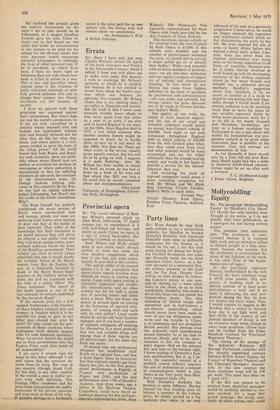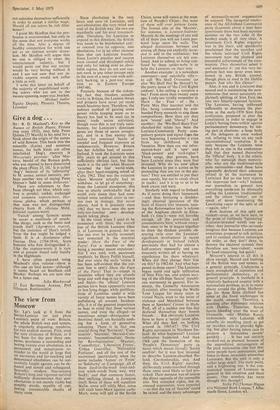Mollycoddling Equity
Sir: The paragraph 'Mollycoddling Equity' in 'Skinflint's City Diary' (13 March) has only recently been brought to my notice, as I do not usually take your publication, so I apologise for not having written sooner.
The sentence your columnist uses, 'The profession is over- crowded because it is overpaid light work and an attractive milieu to delicate people' is a false state- ment, because the premise that the profession is overcrowded be- cause of the lightness of the work, is not valid. (One of the funda- mental laws of lo*ic.) In the provincial repertory theatres, mollycoddled by the Arts Council, the basic minimum wage is £9.50 (nine pounds, fifty new pence). A working week in re- pertory consists of at least seven performances a week and if an actor is rehearsing the next pro- duction during the day, he does not receive any extra wages. Thus, I would venture to suggest to Mr Skinflint that a twelve to thirteen hour day is not light work and that £9.50, in the context of our present standard of living, is not an excessive wage when related to other wage structures. (These facts can be verified from the Esher Standard Contract for Provincial Repertory Theatres.) The timing of the passage of the Industrial Relations Bill through Parliament coincides with the recently negotiated contract between British Actors' Equity, the Council of Repertory Theatres and the Theatrical Managers' Associa- tion. In this new contract the basic minimum wage will be f18 per week. This came into effect on 5 April 1971.
If the Bill was passed in its original form, theatrical managers would be perfectly entitled to em- ploy anybody for a wage that would endanger the living stan- dards of other actors, who could not subsidise themselves sufficiently in order to accept a similar wage. Should all our actors be rich dilet- tantes?
I grant Mr Skinflint that the pro- fession is overcrowded, but only in the sense that not everyone works all the time. Also a degree of healthy competition for work can act as an indirect artistic stimu- lant. Mr Skinflint will argue that no one is obliged to enter the entertainment industry, but I would point out that our society would be very boring without it and I am not sure that our in- visible exports would not suffer a little as well.
I write this letter on behalf of the majority of unpublicised work- ing actors who are not in the money-spinning, super-star, bracket. Michael Sadler Equity Deputy, Phoenix Theatre, Leicester



































 Previous page
Previous page